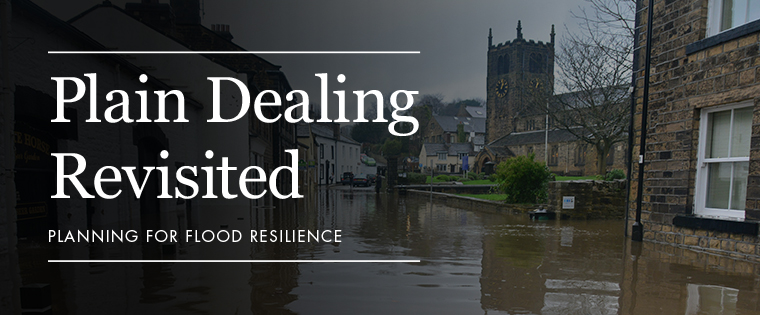Departments must join forces to deliver on government flood risk promises, Localis report urges

Environment and housing ministers must work together to enact promises made in opposition to improve flood defences and boost planning resilience, a new report from think-tank Localis has urged.
In a report published today entitled ‘Plain Dealing Revisited– planning for flood resilience’ the independent place experts set out how in the three years since their original ‘Plain Dealing’ report, sustained housing demand and pressure on local authorities has led to a continuation of development in floodplain areas.
In original research undertaken for their latest report, Localis examined the public planning portals of the 12 English council areas with the highest percentage of properties at risk of flooding during the first half of 2024, finding 7,116 new dwellings in the planning pipeline.
Of these, 1,006 were new permissions[1] for 2024, with the remainder being approvals from previous years continuing to progress through the planning system. In addition, in these high-risk flood areas, some 2,389 new dwellings were granted planning permission on land previously developed or resulting from change-of-use applications, of which 280 were new applications granted this year.
Data collected by Localis in 2021 for the previous Plain Dealing report shows that the same councils granted 1,104 new homes to be built on floodplain land in the first six months of that year. Currently there are no laws against the granting of planning permission for and construction of homes in areas at high risk of flooding, and the Environment Agency compiled 267 instances of homes granted planning permission against their advice on flood risk in the year 2022-23 alone.
Among its key recommendations, Localis calls for new environment secretary Steve Reed to empower the recently established Flood Resilience Taskforce with a remit to not just provide new defences but also review existing schemes and how resilience measures are implemented in the planning system.
The think tank also calls for an urgent uplift in the Environment Agency’s capacity to ensure the maintenance of flood defence assets and to enforce planning regulations.
Localis also recommends that housing secretary Angela Rayner use the Planning and Infrastructure Bill and the revised National Planning Policy Framework to consolidate and reinforce planning resilience measures.
Localis chief executive, Jonathan Werran, said: “Twin government objectives of delivering up to 370,000 new homes a year and enhancing our resilience against flood risk are not of themselves incompatible missions, but will require tightening up and harmonising of policy levers.
“This need for a renewed urgency for joined-up government is especially the case as our research indicates a continuation of planning permissions being granted for new dwellings in areas of such high flood risk.”
Sandy Forsyth, Localis lead clean growth researcher, said: “As long as new planning consents are being given to homes in flood zones on undeveloped land, people and communities will continue to see compounding risks.
“The time is now for the rules to change, as government sets out to rejuvenate the planning system and plans for a newly invigorated era of housebuilding, so that the built environment can be resilient to current and future environmental hazards.”
Caroline Johnson, claims director of personal lines insurance at Allianz UK, said: “It is concerning to see so many homes being given planning permission in these areas. Floods are traumatic events for householders, who can see their homes ruined and a lifetime’s worth of possessions destroyed.
“The Government has announced ambitious plans to build 1.5m homes over the course of this Parliament, and while we know more new homes are necessary, it is important that they are resilient to floods and bad weather
“Our changing climate means that floods and severe weather are likely to become more common. It is important for national and local planners and developers to work together to prevent unnecessary development in high-risk flood areas and ensure that new homes are more resilient to floods.”
[1] Including full, outline and reserved matters applications
